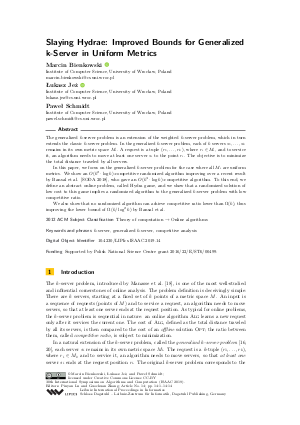Slaying Hydrae: Improved Bounds for Generalized k-Server in Uniform Metrics
Authors
Marcin Bienkowski  ,
Łukasz Jeż
,
Łukasz Jeż  ,
Paweł Schmidt
,
Paweł Schmidt
-
Part of:
Volume:
30th International Symposium on Algorithms and Computation (ISAAC 2019)
Part of: Series: Leibniz International Proceedings in Informatics (LIPIcs)
Part of: Conference: International Symposium on Algorithms and Computation (ISAAC) - License:
 Creative Commons Attribution 3.0 Unported license
Creative Commons Attribution 3.0 Unported license
- Publication Date: 2019-11-28
File

PDF
LIPIcs.ISAAC.2019.14.pdf
- Filesize: 494 kB
- 14 pages
Document Identifiers
Subject Classification
ACM Subject Classification
- Theory of computation → Online algorithms
Keywords
- k-server
- generalized k-server
- competitive analysis
Metrics
- Access Statistics
-
Total Accesses (updated on a weekly basis)
0Document
0Metadata
Abstract
The generalized k-server problem is an extension of the weighted k-server problem, which in turn extends the classic k-server problem. In the generalized k-server problem, each of k servers s_1, ..., s_k remains in its own metric space M_i. A request is a tuple (r_1,...,r_k), where r_i in M_i, and to service it, an algorithm needs to move at least one server s_i to the point r_i. The objective is to minimize the total distance traveled by all servers. In this paper, we focus on the generalized k-server problem for the case where all M_i are uniform metrics. We show an O(k^2 * log k)-competitive randomized algorithm improving over a recent result by Bansal et al. [SODA 2018], who gave an O(k^3 * log k)-competitive algorithm. To this end, we define an abstract online problem, called Hydra game, and we show that a randomized solution of low cost to this game implies a randomized algorithm to the generalized k-server problem with low competitive ratio. We also show that no randomized algorithm can achieve competitive ratio lower than Omega(k), thus improving the lower bound of Omega(k / log^2 k) by Bansal et al.
Cite As Get BibTex
Marcin Bienkowski, Łukasz Jeż, and Paweł Schmidt. Slaying Hydrae: Improved Bounds for Generalized k-Server in Uniform Metrics. In 30th International Symposium on Algorithms and Computation (ISAAC 2019). Leibniz International Proceedings in Informatics (LIPIcs), Volume 149, pp. 14:1-14:14, Schloss Dagstuhl – Leibniz-Zentrum für Informatik (2019)
https://doi.org/10.4230/LIPIcs.ISAAC.2019.14
BibTex
@InProceedings{bienkowski_et_al:LIPIcs.ISAAC.2019.14,
author = {Bienkowski, Marcin and Je\.{z}, {\L}ukasz and Schmidt, Pawe{\l}},
title = {{Slaying Hydrae: Improved Bounds for Generalized k-Server in Uniform Metrics}},
booktitle = {30th International Symposium on Algorithms and Computation (ISAAC 2019)},
pages = {14:1--14:14},
series = {Leibniz International Proceedings in Informatics (LIPIcs)},
ISBN = {978-3-95977-130-6},
ISSN = {1868-8969},
year = {2019},
volume = {149},
editor = {Lu, Pinyan and Zhang, Guochuan},
publisher = {Schloss Dagstuhl -- Leibniz-Zentrum f{\"u}r Informatik},
address = {Dagstuhl, Germany},
URL = {https://drops.dagstuhl.de/entities/document/10.4230/LIPIcs.ISAAC.2019.14},
URN = {urn:nbn:de:0030-drops-115104},
doi = {10.4230/LIPIcs.ISAAC.2019.14},
annote = {Keywords: k-server, generalized k-server, competitive analysis}
}
Author Details
Funding
Supported by Polish National Science Centre grant 2016/22/E/ST6/00499.
References
-
Nikhil Bansal, Marek Eliás, and Grigorios Koumoutsos. Weighted k-Server Bounds via Combinatorial Dichotomies. In Proc. 58th IEEE Symp. on Foundations of Computer Science (FOCS), pages 493-504. IEEE Computer Society, 2017.

-
Nikhil Bansal, Marek Eliás, Grigorios Koumoutsos, and Jesper Nederlof. Competitive Algorithms for Generalized k-Server in Uniform Metrics. In Proc. 29th ACM-SIAM Symp. on Discrete Algorithms (SODA), pages 992-1001, 2018.

-
Yair Bartal, Béla Bollobás, and Manor Mendel. Ramsey-type theorems for metric spaces with applications to online problems. J. Comput. Syst. Sci., 72(5):890-921, 2006.

-
Yair Bartal, Nathan Linial, Manor Mendel, and Assaf Naor. On metric Ramsey-type phenomena. In Proc. 35th ACM Symp. on Theory of Computing (STOC), pages 463-472, 2003.

-
Alan Borodin, Nati Linial, and Michael E. Saks. An optimal on-line algorithm for metrical task system. Journal of the ACM, 39(4):745-763, 1992.

-
Sébastien Bubeck, Michael B. Cohen, Yin Tat Lee, James R. Lee, and Aleksander Madry. k-server via multiscale entropic regularization. In Proc. 50th ACM Symp. on Theory of Computing (STOC), pages 3-16. ACM, 2018.

-
Ashish Chiplunkar and Sundar Vishwanathan. On Randomized Memoryless Algorithms for the Weighted K-Server Problem. In Proc. 54th IEEE Symp. on Foundations of Computer Science (FOCS), pages 11-19, 2013.

-
Marek Chrobak. SIGACT news online algorithms col. 1. SIGACT News, 34(4):68-77, 2003.

-
Marek Chrobak, Howard J. Karloff, Thomas H. Payne, and Sundar Vishwanathan. New Results on Server Problems. SIAM Journal on Discrete Mathematics, 4(2):172-181, 1991.

-
Marek Chrobak and Lawrence L. Larmore. An Optimal On-Line Algorithm for k-Servers on Trees. SIAM Journal on Computing, 20(1):144-148, 1991.

-
Marek Chrobak and Jirí Sgall. The weighted 2-server problem. Theoretical Computer Science, 324(2-3):289-312, 2004.

-
Amos Fiat and Moty Ricklin. Competitive Algorithms for the Weighted Server Problem. Theoretical Computer Science, 130(1):85-99, 1994.

-
Stasys Jukna. Extremal Combinatorics. Springer, 2011.

-
Elias Koutsoupias. The k-server problem. Computer Science Review, 3(2):105-118, 2009.

-
Elias Koutsoupias and Christos H. Papadimitriou. On the k-Server Conjecture. Journal of the ACM, 42(5):971-983, 1995.

-
Elias Koutsoupias and David Scot Taylor. The CNN problem and other k-server variants. Theoretical Computer Science, 324(2-3):347-359, 2004.

-
James R. Lee. Fusible HSTs and the Randomized k-Server Conjecture. In Proc. 59th IEEE Symp. on Foundations of Computer Science (FOCS), pages 438-449, 2018.

-
Mark S. Manasse, Lyle A. McGeoch, and Daniel D. Sleator. Competitive algorithms for server problems. Journal of the ACM, 11(2):208-230, 1990.

-
René Sitters. The Generalized Work Function Algorithm Is Competitive for the Generalized 2-Server Problem. SIAM Journal on Computing, 43(1):96-125, 2014.

-
René A. Sitters and Leen Stougie. The generalized two-server problem. Journal of the ACM, 53(3):437-458, 2006.

-
Daniel D. Sleator and Robert E. Tarjan. Amortized efficiency of list update and paging rules. Communications of the ACM, 28(2):202-208, 1985.

